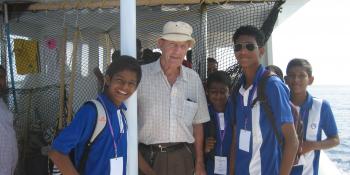Running projects without international volunteers will not help “decolonise development”, says expert after a new report is released by VSO and Northumbria University.
Local volunteers are experts, concludes the first-ever research on “blended volunteering”, VSO’s flagship approach that brings together international and national volunteering skills. To tackle global poverty and inequality, the knowledge of national volunteers’ needs to be valued equally with that of their international counterparts, the report found.
The research questions assumptions about volunteering for development programmes aiming to contribute to the Sustainable Development Goals (SDGs). Professor Matt Baillie Smith led the study with Professor Katy Jenkins from Northumbria University’s Centre for International Development, working alongside researchers in the UK, Nepal, Tanzania, and Uganda.
The report looked at practical examples from VSO projects. Some of the projects covered in the study include Improving Children’s Learning and Participation (ICLP) in Tanzania, Driving Youth Led Agrobusiness and Micro Enterprises (DYNAMIC) in Uganda, and Sisters for Sisters’ Education (S4S) in Nepal.
“There's been a huge debate during the pandemic about whether we can do everything without international volunteers and how ‘this is a good way to ‘decolonise development’,” says Prof. Baillie Smith. “But just removing international volunteers isn’t going to ‘decolonise development’ and there are some risks of relying on this approach.”
“The burden on local volunteers may increase. We will miss out on the dynamic interaction of a blended team. Whether international volunteers exist or not, there are still power hierarchies that need addressing.”
The research, based on interviews and participatory workshops with volunteers, community representatives, and VSO staff, found that there was no “one-size fits all” approach to designing and putting in place successful “volunteer combinations”. There is a need to adapt volunteer planning and management in programmes based on local requirements and local learning, it found.
“The presence of international volunteers brings energy and donor attention to projects, whilst community and national volunteers enable effective engagement with local communities and increase the likelihood that impacts can be sustained due to their particular knowledges and longer-term involvement,” it said.
As one volunteer for Tanzania’s Lake Zone Youth Empowerment (LZYE) project said, “community volunteers continue to perform their duties and better even after the departure of the national volunteers”.
Much existing research on volunteering in the development sector focuses on the role of “international volunteers” like short-term Western gap year participants, or on “voluntourism”.
“This study demonstrates the importance of a blended volunteering approach which brings together international, national, and community volunteers to maximise development outcomes,” said Dr Philip Goodwin, VSO’s chief executive. “A blended volunteering approach is a significant new way of thinking about how countries can succeed in their development journey”.
Professor Jenkins said that past understandings of local community volunteers have often focused on where they are, not the fact that they are experts in their own right. “The research shows that local community volunteers are not just important because of where they live but rather they bring knowledge and expertise, including context specific experiences, which can hold the blend together” she said.
Read an executive summary of our findings
Find out more on the Northumbria University website, including Q&A's with our in country researchers
Case studies
- Tanzania case study report (PDF, 886KB)
- Nepal case study report (PDF, 1,067KB)
- Uganda case study report (PDF, 1,001KB)
Professor Matt Baillie Smith and Professor Katy Jenkins are available for interview, along with Dr Alok Rath, Global Head of Knowledge, Evidence & Learning at VSO, and Rebecca Pursell-Gotz, Research Specialist, plus other staff and volunteers. For more information please contact Amy Fallon on amy.fallon@vsoint.org or on + 44 7494 188 269.
Latest posts

Transforming lives through education: Geoffrey’s VSO legacy
With a deep belief in the transformative power of education, Geoffrey from Norfolk, UK, has devoted his life both in the UK and abroad to making education more accessible for all.
